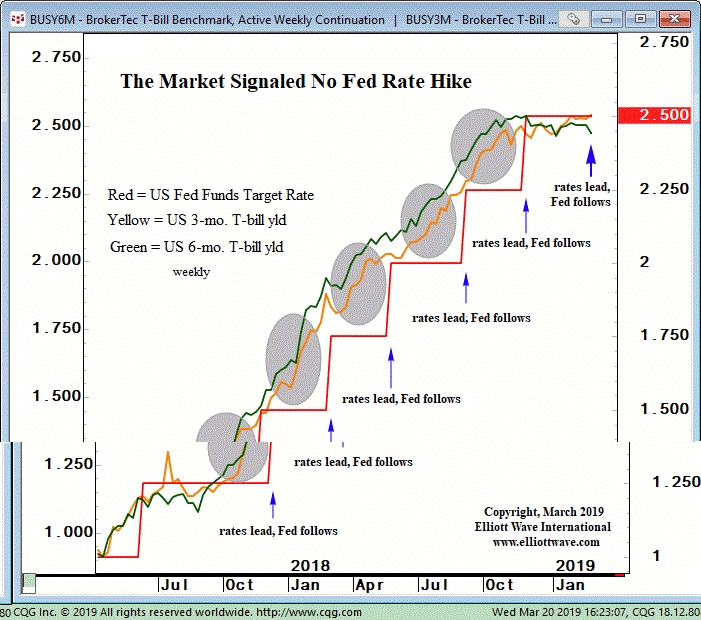The Fed Follows The Market Yet Again
Elliott Wave International | Mar 22, 2019 02:01PM ET
By Steven Hochberg and Peter Kendall
Back in December, we wrote an article titled “Want to Know the Fed’s Next Move? Pay Attention to This Signal.” In the piece, we noted that while most experts believe that central banks set interest rates, it’s actually the other way around—the market leads, and the Fed follows. We pointed out that the December rate hike followed increases in the six-month and three-month U.S. Treasury bill yields set by the market.
What happened with this week’s Fed announcement? Well, you guessed it—the Fed simply followed the market yet again.

Figure 1
Figure 1 is an updated version of the one we showed in our last article. The red line is the U.S. Federal Funds rate, the yellow line is the rate on the 3-month U.S. T-bill and the green line is the rate on the 6-month U.S. T-bill. The latter two rates are freely-traded in the auction arena, while the former rate is set by the Fed.
Now observe the grey ellipses. Throughout 2017-2018, the rates on 3-and-6-month U.S. T-bills were rising steadily, pushing above the Fed Fund’s rate. During the period shown on the graph, the Fed raised its interest rate six times, each time to keep up with the rising T-bill rates. The interest-rate market is the dog wagging the central-bank tail.
Now note what T-bill rates have been doing since November of last year; they’ve stopped rising. Rates have moved net-sideways, which was the market’s way of signaling that the Fed would not raise the Fed Funds rate this week.
Too many investors and pundits obsess over whether the Fed will raise or lower the Fed Funds rate and what it all supposedly means. First, if you want to know what the Fed will or will not do, simply look at T-bills, as shown on the chart. Second, whatever their action, it doesn’t matter because the Fed’s interest-rate policy cannot force people to borrow. See for more evidence.
About Steven Hochberg
Steven Hochberg co-edits Elliott Wave International's Elliott Wave Financial Forecast with Peter Kendall, writes the Short Term Update thrice weekly, and provides commentary on the U.S. stock market, interest rates and precious metals for Global Market Perspective. Over the years, Hochberg has become a sought-after lecturer and has been quoted in various media outlets, such as USA Today, The Los Angeles Times, The Washington Post, Barron’s, Reuters and Bloomberg. He has also discussed financial markets on CNBC, MSNBC and Bloomberg Television. Hochberg began his professional career with Merrill Lynch and joined Elliott Wave International in 1994.
About Peter Kendall
Peter Kendall co-edits Elliott Wave International’s Elliott Wave Financial Forecast with Steven Hochberg. He also provides commentary on cultural trends, the economy and the U.S. stock market for the firm’s Global Market Perspective. Kendall began his career as a financial reporter and columnist in 1983. He wrote “On the Money,” a column for The Business Journal, from 1991 to 1997. Kendall joined Elliott Wave International as a researcher in 1992 and served as the director of EWI’s Center for Cultural Studies, where he focused on popular culture and the new science of socionomics. He has been contributing to Global Market Perspective since 1995, and he also contributes to EWI’s Short Term Update. He graduated from Miami University in Oxford, Ohio, with a degree in Business Administration.
Trading in financial instruments and/or cryptocurrencies involves high risks including the risk of losing some, or all, of your investment amount, and may not be suitable for all investors. Prices of cryptocurrencies are extremely volatile and may be affected by external factors such as financial, regulatory or political events. Trading on margin increases the financial risks.
Before deciding to trade in financial instrument or cryptocurrencies you should be fully informed of the risks and costs associated with trading the financial markets, carefully consider your investment objectives, level of experience, and risk appetite, and seek professional advice where needed.
Fusion Media would like to remind you that the data contained in this website is not necessarily real-time nor accurate. The data and prices on the website are not necessarily provided by any market or exchange, but may be provided by market makers, and so prices may not be accurate and may differ from the actual price at any given market, meaning prices are indicative and not appropriate for trading purposes. Fusion Media and any provider of the data contained in this website will not accept liability for any loss or damage as a result of your trading, or your reliance on the information contained within this website.
It is prohibited to use, store, reproduce, display, modify, transmit or distribute the data contained in this website without the explicit prior written permission of Fusion Media and/or the data provider. All intellectual property rights are reserved by the providers and/or the exchange providing the data contained in this website.
Fusion Media may be compensated by the advertisers that appear on the website, based on your interaction with the advertisements or advertisers.